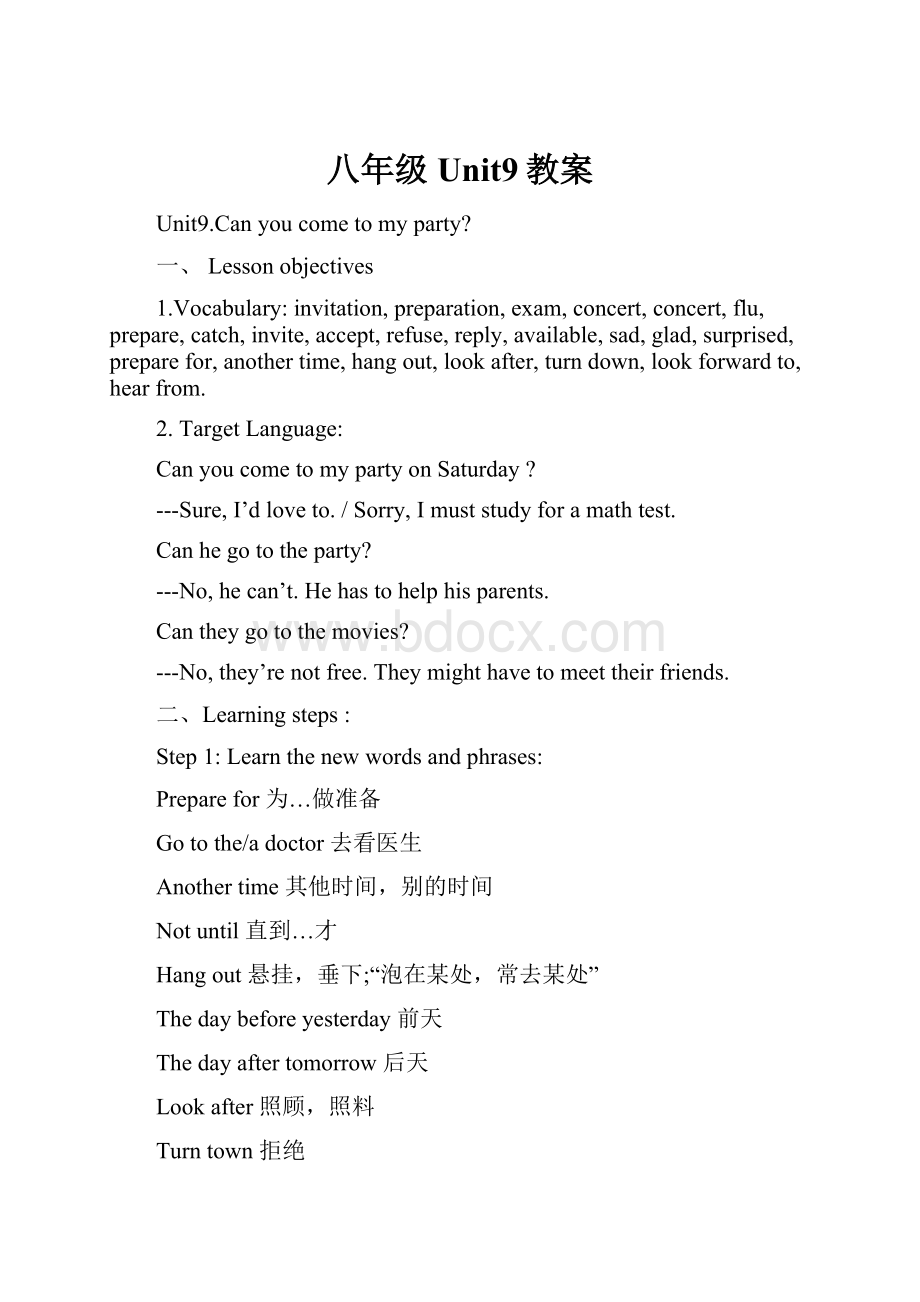八年级Unit9教案.docx
《八年级Unit9教案.docx》由会员分享,可在线阅读,更多相关《八年级Unit9教案.docx(18页珍藏版)》请在冰豆网上搜索。

八年级Unit9教案
Unit9.Canyoucometomyparty?
一、Lessonobjectives
1.Vocabulary:
invitation,preparation,exam,concert,concert,flu,prepare,catch,invite,accept,refuse,reply,available,sad,glad,surprised,preparefor,anothertime,hangout,lookafter,turndown,lookforwardto,hearfrom.
2.TargetLanguage:
CanyoucometomypartyonSaturday?
---Sure,I’dloveto./Sorry,Imuststudyforamathtest.
Canhegototheparty?
---No,hecan’t.Hehastohelphisparents.
Cantheygotothemovies?
---No,they’renotfree.Theymighthavetomeettheirfriends.
二、Learningsteps:
Step1:
Learnthenewwordsandphrases:
Preparefor为…做准备
Gotothe/adoctor去看医生
Anothertime其他时间,别的时间
Notuntil直到…才
Hangout悬挂,垂下;“泡在某处,常去某处”
Thedaybeforeyesterday前天
Thedayaftertomorrow后天
Lookafter照顾,照料
Turntown拒绝
Takeatrip去旅行
Helpout分担工作,解决难题
Lookforwardto盼望,期望
Hearfrom接到(某人的)信,电话
Replyto回复
Step2:
Haveadictationaboutthewordsandphrase.
Step3:
Readourlessonandfindoutthemainlanguagepoint.
SectionA:
1.—Jenny,canyoucometomypartyonSaturdayafternoon?
詹妮,周六下午你能来参加我的聚会吗?
—Sure,I’dloveto.当然,我很愿意。
(1)此句中can表示请求,这是邀请的一种表达方式。
其他的还有:
Wouldyouliketo…?
Couldyou…?
Ihopeyoucan…
e.g.Wouldyouliketogotothemovieswithme?
你愿意和我一起去看电影吗?
Couldyouhavedinnerwithus?
和我们一起吃顿饭
Ihopeyoucangowithme.我希望你能和我一起去。
辨析:
can与may
①这两个情态动词都可以表示“许可”。
在征求对方的意见时,用may较多。
e.g.MayIgonow?
现在我可以走吗?
②在询问客观上(按规定)是否可以时,用can更好一些。
e.g.Canwetakethebooksout?
我们能把书拿出去吗?
③在两者都可以用时,may显得客气一些。
e.g.MayItakethisseat?
我可以坐在这儿吗?
④在陈述句中,用can时较多。
如果用may就显得不太客气。
e.g.Youcansithere.你可以坐在这儿。
⑤can还可以表示能力。
e.g.CanyouspeakEnglish?
你会说英语吗?
(may没有这种用法)
(2)Sure,I’dloveto.当然,我很愿意。
I’dloveto.是省略句,省略与问句相当的部分,即cometoyourparty,但应注意不定式符号to应该保留,不能省略。
e.g.—Willyoucome?
你能来吗?
—I’dloveto.我很乐意。
(3)onSaturdayafternoon意为“在周六的下午”。
当时间具体到某一天或某一天的上午、下午或晚上时,用介词on而不用介词in。
e.g.onthemorningofMay1st 在五月一号上午
onMondayevening在周一晚上
2.I’msorry,Ican’t.Ihavetohelpmyparents.很抱歉我不能去。
我得给我父母帮忙。
在英语里,拒绝别人的邀请时,首先要表示歉意,通常用I’msorry,Sorry或I’mafraid等,然后再说明理由。
这样做主要是出于礼貌,不致于伤害对方。
e.g.—Canyoucometomyhometomorrow?
你明天能来我家吗?
—I’msorry/Sorry,Ican’t.Ihavetodomyhomework.对不起,我去不了。
我得做作业。
haveto是情态动词,意思是“不得不;必须”,后跟动词原形,但在使用上,我们仍然把它当作行为动词,它本身有人称和数的变化。
e.g.Doyouhavetohelpyourparentsattheweekends?
你在周末必须帮你父母做事吗?
Shedoesn’thavetogotoherguitarlessontoday.她今天不必去上吉他课了。
辨析:
haveto与must
(1)haveto表示“不得不;必须”,着重于客观的需要。
e.g.Itrainedyesterdayandwehadtostayathome.
昨天下雨了,我们不得不呆在家里。
(2)must表示“必须”时,着重于说话者主观上认为有义务和必要;当它表示过去情况时常用hadto代替。
e.g.Wemustworkhard我们必须要努力学习。
Ihadtogetupearlyyesterday.昨天我必须很早起床。
3.Ihavetoprepareforanexam.我得准备考试
(1)prepare此处用作不及物动词,意为“使做好准备;把……准备好”,其名词形式为preparation,意为“准备;准备工作”。
常用短语preparefor意为“为……做准备”。
e.g.Ican’tgotothemovieswithyoubecauseIhavetoprepareforanexam.
我不能和你一起去看电影,因为我不得不为考试做准备。
Mumispreparingthetraditionaldinner,andwearepreparingfortheNewYear.
妈妈在准备传统晚宴,我们在为新年做准备。
拓展:
①prepare还可用作及物动词,意为“准备”,后接名词或代词作宾语。
e.g.OurEnglishteacherispreparingthelessons.我们的英语老师正在备课。
Shepreparedusanicebreakfast.=Shepreparedanicebreakfastforus。
她给我们准备了可口的早餐。
②preparetodosth.意为“准备做某事”。
e.g.Takingoutapieceofpaper,hepreparedtowritetohisparents.
他拿出纸,准备给父母写信。
③preparesbsth表示“给…准备…”也可转换为preparesthforsb
Shepreparedusanicebreakfast.=Shepreparedanicebreakfastforus.
(2)exam可数名词,是examination的缩写形式,意为“考试”,表示“一次考试”时其前应用不定冠词an,即anexam。
拓展:
与exam相关的短语
entranceexam 入学考试failtheexam 考试不及格
passtheexam 通过考试,考试及格take/haveanexam 参加考试
4.I’msorry,I’mnotavailable.对不起。
我没有空。
available为形容词,意为“有空的;可获得的,有时间交谈或聊天”。
其同义词为free。
后可用todo引出具体的事情。
e.g.Iamavailableintheafternoon.我下午有空。
—Canyoucometomypartythisevening?
今天晚上你能来参加我的聚会吗?
—Sorry,I’mnotavailable.Maybeanothertime.对不起,我没有空,也许别的时间吧。
I’mafraidI’mnotavailabletohelpwiththeschoolshow.
我怕是没空帮着准备学校的演出了。
5.Ihavetoomuchhomeworkthisweekend.这个周末我有太多的家庭作业要做。
toomuch为形容词性短语,与toomany同义,意思是“太多的”。
只是前者修饰不可数名词,而后者修饰可数名词。
如:
e.g.Thereistoomuchrainhereinsummer.这儿夏天的雨水太多。
TherearetoomanypeopleinthemallonSunday.星期天商场里的人太多。
辨析:
toomuch与muchtoo
(1)toomuch主要有两种用法。
①用作形容词性短语,意思是“太多的”,修饰不可数名词。
e.g.Ihatetoomuchhomework.我讨厌太多的家庭作业。
②用作副词性短语,意思是“太多”,修饰动词。
e.g.Don’tdrinktoomuch.别喝得太多。
(2)muchtoo副词性短语,意思是“太”,修饰形容词或副词。
e.g.Thequestionismuchtoodifficult.这个问题太难了。
6.That’stoobad.Maybeanothertime.那太糟糕了。
也许要(换成)另一个时间。
(1)maybe是副词,意思是“也许”,同义词是perhaps,一般置于句首。
e.g.Maybetheaddressisinyourinsidepocket.也许地址在你的内衣口袋里。
(2)another是形容词或代词,意思是“(三者或三者以上中的)另一个(的)”,后面一般接单数名词。
e.g.Wouldyoulikeanotherorange?
你还想要个橘子吗?
Oneboywasreading;anotherwaswriting.一个男孩在读书;另一个在写字。
拓展:
another后面也可以接复数名词,但前面必须有数词,结构是“another+数词+名词复数”,意思是“又/另/再几个……”。
如:
e.g.Pleasegivemeanothertwocakes.请再给我两块蛋糕。
Wehaveanothertwomathproblemstodo.我们还有两道数学题要做。
另外,这种结构还可以换成“数词+more+名词复数”结构。
e.g.Weneedanothertwobottlesoforange
=Weneedtwomorebottlesoforange.我们还需要两瓶橘子汁。
7.Oh,butSamisn’tleavinguntilnextWednesday.哦,但是萨姆直到下周三才离开。
until用作介词,意为“(表动作、状态的继续)到……时;直到……为止”。
until常用于否定句中,与not构成固定结构,即not...until意为“直到……才”。
e.g.Iwaiteduntilthreeo’clock.我一直等到三点钟。
Thenoisedidn’tstopuntilmidnight.噪音一直到午夜才停止。
拓展:
until还可用作连词,表动作、状态持续到另一动作或状态出现之前,意为“直到……为止”。
e.g.Helivedwithhisparentsuntilhegotmarried.他与父母住在一起直到结婚为止。
Thechildrenwon’tcomehomeuntilitisdark.孩子们直到天黑才回家。
Don’tleavetoday’sworktilltomorrow.
8.CanyouhangoutwithusonMondaynight?
你能在周一晚上跟我们在一起吗?
hangout意为“常去某处;泡在某处”。
其中,hang动词,意为“悬挂;垂下”。
其过去式为hung。
e.g.Helikesreadingandheoftenhangsoutinthebookshop.
他喜欢阅读,并且他经常去书店读书。
Hangthepictureonthewall.把这幅画挂到墙上。
注意:
hang作动词,意为“(被)吊死,(被)绞死”之意时,其过去式为hanged。
拓展:
由hang构成的短语:
hangon 紧紧抓住
hangabout(在某处)闲荡
hangup 挂断电话;悬挂,挂起
9.CatchyouonMonday!
周一见!
此处catchyou常用于口语中,意为“再见”。
e.g.I’mnothererightnow.Catchyoulater!
我现在不在这里,回头见!
catch动词,意为“及时赶上;接住;抓住”。
其第三人称单数形式为catches,其过去式为caught。
e.g.Thecatlikescatchingmice。
猫喜欢捉老鼠。
You’llhavetoworkhardertocatchupwithtopstudentsinyourclass.
要赶上班里优秀的学生你得更加努力才行。
拓展:
由catch构成的常用短语:
catchacold感冒catchthetrain赶上火车catchupwith赶上;跟上
catchsb.’seye引起某人的注意catchholdof 抓住
10.I’mafraidnot.恐怕不能。
I’mafraid...意为“恐怕……”,用于推测令人不愉快的事。
表示否定时,用I’mafraidnot.“恐怕不能”;
表示肯定时,用I’mafraidso.“恐怕如此”。
e.g.—Lookattheblackclouds.Itlookslikerain.看那乌云,像是要下雨了。
—I’mafraidso.恐怕如此。
—Canyougototheconcert?
你能去听音乐会吗?
—Sorry.I’mafraidnot.对不起,恐怕不能。
11.Whoareyougoingtothemovieswith?
你打算和谁一起去看电影?
本句为现在进行时表示将来。
英语中,一些表示位移的动词,如go,come,move,fly,arrive,leave等,均可用现在进行时表示将来。
e.g.Iamgoingtothemoviestomorrow.明天我打算去看电影。
LiuHuiiscomingtonight.今晚刘辉要来。
SectionB:
1.—What’stoday?
今天是什么日子?
—It’sMondaythe14th.今天是14号。
星期一。
What’stoday?
用来提问今天是几号、星期几。
回答时,通常用星期和日期,也可用节日。
—What’stoday?
今天是什么日子?
—It’sTeachers’Day.今天是教师节。
拓展:
①What’sthedatetoday?
意为“今天是几月几号?
”,回答的是日期。
e.g.—What’sthedatetoday?
今天是几月几号啊?
—It’sSeptember10th.九月十号。
②Whatdayisittoday?
意为“今天星期几?
”回答要用星期几。
e.g.—Whatdayisittoday?
今天是星期几?
—It’sMonday.星期一。
2.Canyouplaytenniswithme?
你能和我一起去打网球吗?
playtennis意为“打网球”。
play与球类名词连用时,球类名词前不能加任何冠词;而当play与西洋乐器名词连用时,西洋乐器名词前必须加定冠词the。
e.g.playbasketball 打篮球
playsoccer 踢足球
playthepiano 弹钢琴
playtheviolin 拉小提琴
3.Whatagreatidea!
多好的主意啊!
这是一个由what引导的感叹句。
其结构为:
What+a/an+形容词+可数名词单数(+主语+谓语)!
e.g.Whatabeautifulgirl(sheis)!
她是一位多么漂亮的女孩啊!
拓展:
常见的其他感叹句结构:
①What+形容词+可数名词复数/不可数名词(+主语+谓语)!
e.g.Whatdeliciousfood!
多么美味的食物啊!
②How+形容词/副词+主语+谓语!
e.g.Howbeautifulsheis!
她是多么漂亮啊!
Howwellheplaysthepiano!
他钢琴弹得多么好啊!
Whataninterestingbookitis!
=Howinterestingthebookis!
那本书多么有趣呀!
注意:
what引导的感叹句可以与how引导的感叹句进行同义句转换。
4.ShehelpedmetoimprovemyEnglishsomuch.她帮助我大大提高了我的英语。
(1)helpsb.todosth.意为“帮助某人做某事”。
help后也可跟省略to的动词不定式,即helpsb.dosth.。
e.g.Canyouhelpme(to)preparefortheparty?
你能帮我为聚会做准备吗?
拓展:
①helpsb.withsth.意为“在某一方面帮助某人”
e.g.Mr.ZhangoftenhelpsmewithmyEnglish.张老师经常在英语方面帮助我。
②helponeselftosth.意为“随便吃……”。
e.g.Helpyourselvestosomefish,children!
孩子们,随便吃些鱼!
(2)somuch意为“如此多”,其中so起加强语气、强调的作用。
其后接不可数名词,也可修饰动词,作状语。
e.g.Therewassomuchnoiseoutside.外面嘈杂声很多。
Thankyousomuch.非常感谢你。
5.I’msadtoseehergo,andthispartyisthebestwaytosay“Thankyouandgoodbye.”
看到她走我很难过,并且这个聚会是跟她说“感谢和再见”的最好方式。
(1)sad形容词,意为“(令人)悲哀的;(令人)难过的”。
其比较级为sadder,最高级为saddest。
besadtodosth.表示“做某事很悲伤”。
e.g.I’msadtohearthebadnews.听到这个坏消息,我很难过。
(2)seesb.dosth.表示“看到某人做某事”。
如果表示看到某人正在做某事,则用seesb.doingsth.表示。
e.g.Ioftenseetheboyplaysoccerinthepark.
我经常看到那个男孩在公园里踢足球。
(强调经常踢足球)
IsawtheboyplayingsoccerwhenIwalkedinthepark.
当我在公园里散步时,我看到那个男孩正在踢足球。
(强调正在踢足球)
(3)thebestwaytodosth.意为“做某事的最好方法/方式”。
e.g.Thebestwaytoremembernewwordsisrepeating.记忆新单词的最好方法是重复。
6.MyfamilyistakingatriptoWuhanattheendofthismonthtovisitmyauntanduncle.
这个月末,我全家要去武汉旅行。
并看望我的叔叔和婶婶。
(1)takeatrip意为“去旅行”。
e.g.Let’stakeatrip!
咱们去旅行吧!
(2)attheendof意为“在……的末尾;在……尽头”,可以表示地点,也可以表示时间。
e.g.Youcanseeabookshopattheendoftheroad.在路的尽头你会看到一家书店。
Attheendofthemonth,we’llhaveanexam.在这个月末,我们将会考试。
拓展:
①bytheendof...意为“到……末为止”。
e.g.Wehadlearned1,000wordsbytheendoflastmonth.
到上个月末为止,我们已经学了1000个单词。
②intheend意为“最后;终于”。
e.g.Hefoundthebagintheend.最后他找到了书包。
7.However,I’dstillbegladtohelpoutwithanyofthepartypreparations,likeplanningthegames.然而,我仍然很高兴帮忙做一些准备工作,像计划一下游戏。
(1)glad形容词,意为“高兴的;愿意的”。
e.g.Iamgladtohelpyou.我很乐意帮助你。
(2)anyofthepartypreparations聚会准备中的任何事
any在此句中用作代词,意为“无论哪个;任何一个/一些”。
e.g.They’reallfree—takeanyofthemyoulike.
它们都是免费的,你喜欢哪